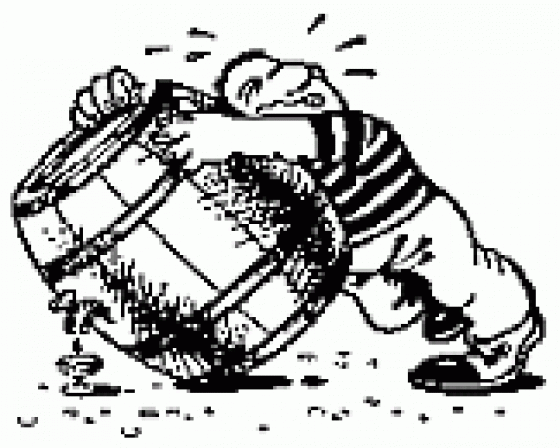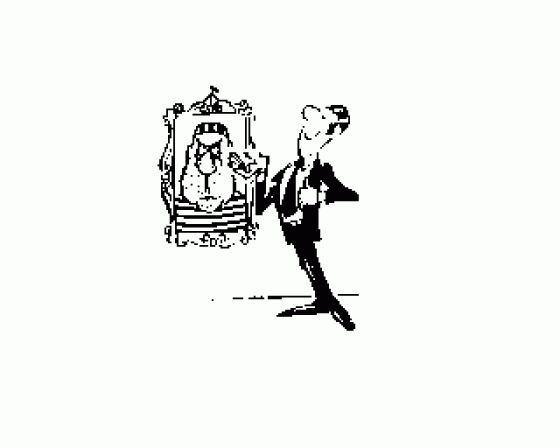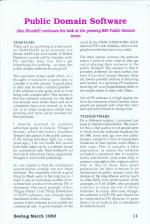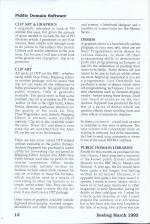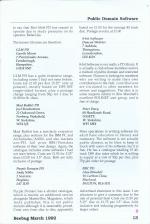
Beebug
 1st March 1992
1st March 1992
Categories: Review: Software
Author: Alan Blundell
Published in Beebug Volume 10 Number 9
Alan Blundell continues his look at the growing BBC Public Domain scene.
TANSTAAFL
"There ain't no such thing as a free lunch" (or TANSTAAFL as an acronym) is a phrase which any avid reader of Robert Heinlein's novels will be familiar with. Put another way, you don't get something for nothing - so how can public domain software be any good?
This question arises quite often, so I thought it would be a good idea to consider it in this column. A good place to start may be with a similar question - if the software is any good, why is it not being sold commercially? One answer is that the software industry for the Beeb has already seen better days and most companies have now moved on to the Arc or to other computers which have growing and more active markets for their products.
I recently received an excellent adventure game to look at, Village Of Secrets, which the author (Jonathan Temple) has placed in the public domain. If the timing had been right (i.e. a few years ago), I do not doubt this would have been taken up by a software house for commercial sale: Peter Killworth (of Acornsoft adventure fame) apparently thought it 'well worth publishing'.
So, one answer is that the commercial opportunities simply are not there anymore. This hopefully will be a good thing for Beeb users in the long run, as I hope to see an increasing number of ex-commercial products becoming PD or shareware. One early example of this, Plague Planet from Philip Hawthorne of ALPS software, has already been mentioned in this column. Another answer is that software is not suitable for commercial sale. A good example of this could be the VIEW/VIEWSTORE/ASCII national STD code datafiles, which many people nevertheless find very useful.
The other answer concerns the software author's point of view: what do they get out of placing their software in the public domain? The answer to that is probably different for each author, but even if you don't accept altruism, there are always possible motives in becoming well known to a growing PD audience, showing off your programming skills or the simple desire to share with others.
Not all PD software is of high quality, but from the comments which I receive, many people are pleased with what they have seen and look forward to seeing more.
Telesoftware
On a different subject, I promised last issue to mention telesoftware. My reason for this is that quite a lot of people seem to think that the software broadcast by the BBC some time ago now was public domain, simply by virtue of having been broadcast so that anyone could obtain a free copy. This is actually a false impression, as unless the software included a statement that it could be freely distributed (and some did), it remains copyright to the original author.
One or two of these have given permission for their software to be distributed as public domain since the demise of the telesoftware service (such as Allan Kelly, who wrote several utility packages, or E.M. Jolliffe, who produced software to check the life of NiCad batteries). In every other case, though, the software is not PD, and should not be submitted to PD libraries (it gives them a lot of work to do) or distributed by bulletin board.
Clip Art And Graphics
I originally intended to look at PD utilities this issue, but given the amount of space needed to include the list of PD libraries which I promised in my first column, there simply isn't enough room to do justice to the subject this month.
Utilities will receive attention in the next issue, but for now I will take a brief look at the general area of graphics - clip art in particular.
Clip Art
All users of DTP on the BBC, whether using AMX Stop Press, Wapping Editor or another package, will be aware that clip art can make all the difference to home-produced work. Yet, apart from the public domain, little is generally available. The good news is that some excellent clip art is available as PD. One 'author' (if that is the right term), Oliver Debus, deserves particular attention for the quality of his work for Stop Press/Pagemaker and, latterly, Wapping Editor; it contains some excellent material. Clip art is also available under the name 'Dover Art' and there is even some clip art converted from the Atari ST, via the use of an Archimedes.
There are also some useful DTP-related utilities available in the public domain. Andrew Pepperell has produced a useful utility for converting clip art saved in Wapping Editor format into AMX Stop Press format and also to perform the reverse conversion. Other handy machine-code utilities written by Andrew include stand-alone viewers for clip art in either of these file formats, which could be used as a means of converting to other file formats or to simple 'saved screen' files. They can also, of course, be used to enjoy the clip art even if you don't own a DTP package.
Other types of graphics available include digitised photographs, scanned images, Mandelbrot and other fractal algorithms and screens, a letterhead designer and a number of screen fonts for the Master Series.
Demos
A graphics demo is a functionally useless program, so (you may ask), what use are they? Programmers write demos for various reasons; to show off their programming skills, to demonstrate particular programming techniques or just for the satisfaction of pushing their micro to its limits. Some demos are just meant to be nice to look at, whilst others are more helpful as inspiration if you are a programmer. Lars Osterballe has produced a series of demos which show off programming techniques I have not seen elsewhere, such as overscan display modes - before seeing these demos, I had only heard of overscan on the Arc!
Andrew Pepperell has produced the first few of a series of demos which use parallax effects, fancy scrolling fonts and other effects in impressive displays.
So there you have it - a brief look at what is available in this area of software. The next column will concentrate more on looking at software, but in the meantime, feel free to send your comments or views to me at the usual Beebug address.
Public Domain Libraries
Finally for this month, as promised in my first column, I have prepared a summary of the known public domain software libraries for the BBC Micro, Master and Electron. A year ago, the list would have been quite a bit longer, but having written to all known libraries, it is apparent that quite a few have ceased to operate. I wrote to every library which I knew of or had seen mentioned in other magazines in early December, asking for details of their catalogue, etc. I asked for a fairly quick response so that I could prepare the summary over Christmas, but in fact have only received six replies at the time of writing. One of those was just to say that Red Shift PD has ceased to operate due to study pressures on its operator, Rafael Jay.
The known libraries are therefore:
GLM PD
Gareth Moore
2 Pierrefondes Avenue
Farnborough
Hampshire GU14 8NF
GLM PD has a quite extensive range, including some I had not seen before. Costs are £1.00 per disc (5.25" only at present), mostly based on DFS 80T single-sided format, plus a postage charge ranging from 50p for 1 disc to £1.80 for 8+ discs.
Mad Rabbit PD
Joel Rowbottom
22 Oakwood Grove
Norbury
Wakefield
W. Yorkshire WF4 5JE
Mad Rabbit has a similarly extensive range, plus sections for the IBM PC and Archimedes/A3000, and also markets non-PD, full price BBS/Viewdata software of their own design. Again, the catalogue includes some software I had not seen before. Costs are £1.50 for 5.25" discs/£2.00 for 3.5" discs. Both are fully inclusive of postage.
Purple Domain PD
Andy Nibbs
2 Seaview
Hoylake L47 2DD
Purple Domain has a shorter catalogue, which is mainly an additional service alongside MasterDisc Magazine, which Andy publishes; this is not public domain although it is reasonably priced. Costs vary from disc to disc, apparently based on £1.00 for the average 80 track disc. Postage is extra, at £1.00
8-Bit Software
Duncan Webster
7 Ashdale
Thringstone
Leicestershire LE6 4LW
8-bit Software is not really a PD library. It is actually a club whose members receive a mixture of public domain and restricted software. Duncan is looking for members who are willing to make their own contributions to the club; contributions are circulated to other members for review and suggestions. The idea is in some respects similar to Ron Marshall's excellent SOLINET user group, and is free of charge.
Peter Davy
Peter Davy
68 Headlands Road
OSSETT
W. Yorkshire WEF5 8HX
Peter specialises in writing software for adult basic education in literacy and numeracy. The software is not actually public domain, as he likes to keep in touch with users of his software, but it is free. He has a catalogue totalling 15 40-track DFS disc sides which he is willing to supply at a cost of 50p per disc, plus 75p per order for postage.
BBC PD
Alan Blundell
18 Carlton Close
Blackrod
Bolton BL6 5DL
Advertised elsewhere in this issue: I am reluctant to give a summary due to the risk of personal bias! Costs are £1.50 per 5.25" disc or £1.75 per 3.5" disc, fully inclusive and reducing progressively for larger orders.
This article was converted to a web page from the following pages of Beebug Volume 10 Number 9.


